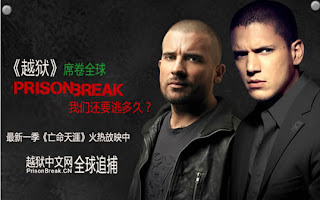China jails rights activist outspoken on TibetBy Chris Buckley
Guardian - UK
BEIJING, April 3 (Reuters) - A Buddhist Chinese dissident outspoken on Tibet and other sensitive topics was jailed for three-and-a-half years on Thursday, a conviction likely to become a focus of international rights campaigns ahead of the Beijing Olympics.
Hu Jia, 34, was found guilty of "inciting subversion of state power" for criticising the ruling Communist Party, a verdict at which the United States expressed dismay.
"In this Olympic year, we urge China to seize the opportunity to put its best face forward and take steps to improve its record on human rights and religious freedom," the U.S. Embassy said in a statement.
The official Xinhua news agency said Hu had made a "confession of crime and acceptance of punishment", leading the court to issue a relatively light sentence. Hu's two lawyers said he had acknowledged "excesses".
"In the end, I think that he came to accept that some of his statements were contrary to the law as it stands," said defence lawyer Li Jinsong.
"So to some extent he accepted the prosecution's allegations."
Hu has 10 days starting on Friday to decide whether to appeal, but Li said he was unlikely to do so. Hu could apply for medical release to treat a bad liver and other illnesses, the lawyer added.
The "inciting subversion" charge can attract a jail term of five years or longer, and before the hearing lawyer Li Fangping said a long sentence was likely. After the hearing he said he was unaware of any deal in return for the sentence.
Another Chinese dissident, Yang Chunlin, who called for human rights to take precedence over the Olympic Games, was sentenced to five years in jail in late March for the same crime.
Foreign reporters and diplomats were excluded from Hu's hearing but Xinhua gave details of the offences.
The court heard that from August 2006 to October 2007, Hu published articles on overseas-run Web sites, made comments in interviews with foreign media and "repeatedly instigated other people to subvert the state's political power and socialist system", Xinhua said.
In two Web site articles, one on law enforcement ahead of last year's Communisty Party Congress, and one entitled "One Country Doesn't Need Two Systems", Hu spread "malicious rumours and committed libel", Xinhua quoted the verdict as saying.
Dozens of well-wishers gathered outside the court to express support for Hu and rowdily air their own grievances.
"Hu Jia is a hero to us because he stood up to speak out, so we should also speak out," said one of them, Li Hai.
International human rights groups were quick to condemn the verdict.
"This verdict is a slap in the face for Hu Jia and a warning to any other activists in China who dare to raise human rights concerns publicly," said Mark Allison of Amnesty International.
"It also betrays promises made by Chinese officials that human rights would improve in the run-up to the Olympics."
WIFE UNDER HOUSE ARREST
Starting with advocacy for rural AIDS sufferers, Hu emerged as one of the nation's most vocal advocates of democratic rights, religious freedom and self-determination for Tibet, recently shaken by protests and a security crackdown.
"Hu spread malicious rumours, and committed libel in an attempt to subvert the state's political power and socialist system," the court said, according to Xinhua.
His conviction is likely to become a focus for critics of the Communist Party's strict controls on dissent and protest ahead of the Olympics in August.
U.S. Secretary of State Condoleezza Rice raised Hu's case when in Beijing in February, and the European Union and other Western governments have also pressed China on the matter.
Hu's relatively rapid trial suggested authorities wanted to get it out of the way well before the Games, said Joshua Rosenzweig of the Duihua Foundation, a San Francisco-based group that works to free Chinese political prisoners.
"I think a lot of people hoped that, given the damage that China's international image has suffered over the past few weeks, ... Hu would have been treated with more leniency," Rosenzweig said.
Hu was detained by police in late December after spending more than 200 days under house arrest in a Beijing apartment complex.
"I don't think that three-and-a-half years is actually all that light," said Rosenzweig. "Especially when you add in the two years of what amounts to illegal house arrest."
Hu's wife, Zeng Jinyan, who has also often criticised the Chinese government, and their infant daughter remain under house arrest and their telephone is cut off.
Zeng attended the hearing, emerging with her baby from the courthouse visibly upset before being whisked away in a police vehicle.
(Additional reporting by John Ruwitch in Hong Kong; Editing by Nick Macfie and Jerry Norton)



























